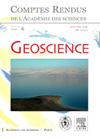墨西哥Matzitzi组时代的古植物学和孢粉学证据
IF 1.9
4区 地球科学
Q3 GEOSCIENCES, MULTIDISCIPLINARY
引用次数: 2
摘要
本研究解决了墨西哥普埃布拉州和瓦哈卡州Matzitzi组的一些地层问题。这个单元的年龄分配是有争议的,尽管今天大多数研究人员都接受了基于墨西哥巨蝶龙的存在的Leonardian年龄(Kungurian,279.3-272.3 Ma)。然而,在对正模和两个副模进行重新检查后,由于缺乏诊断性的分类学特征,无法将该化石型物种归入巨翅目。除去该地层中存在的巨型蕨类植物,大型植物群的年龄似乎是二叠纪。采集样品进行孢粉学分析,以确定地层的年龄。所研究的孢粉组合似乎经过了重新整理,由18个化石分类群代表,分为以下属:Calamospora、Deltodospora、Densosporites、Granulatisporites、Laevigatosporites,Latipulvinites、Lophotrietes、Platysaccus、Puntatosporites和Raistrickia,Schopfipolennites、Thymospora、Triquitrites、Verrucosisporites和Vesicapora。根据kosankii Latipulvinites和thiessenii Thymospora的存在,所描述的孢粉形态可能是宾夕法尼亚晚期的。今后应解决生物地层学和地质年代的差异。本文章由计算机程序翻译,如有差异,请以英文原文为准。
Paleobotanical and palynological evidence for the age of the Matzitzi Formation, Mexico
This study addresses some of the stratigraphical problems of the Matzitzi Formation of Puebla and Oaxaca States in Mexico. The age assignment for this unit is controversial although most researchers today accept a Leonardian age (Kungurian, 279.3–272.3 Ma) based on the presence of the gigantopterid Lonesomia mexicana Weber. However, after re-examination of the holotype and two paratypes, the absence of diagnostic taxonomic characters prevents the assignment of this fossil type species to the gigantopterid group. Excluding the presence of gigantopterids in this formation, the macroflora seems to be Permian in age. Samples were collected for palynological analysis to determine the age of the formation. Studied palynological assemblages seem to be reworked and are represented by 18 fossil taxa assigned to the following genera: Calamospora, Deltoidospora, Densosporites, Granulatisporites, Laevigatosporites, Latipulvinites, Lophotriletes, Platysaccus, Punctatosporites, Raistrickia, Schopfipollenites, Thymospora, Triquitrites, Verrucosisporites, and Vesicaspora. Described palynomorphs are likely Late Pennsylvanian according to the presence of Latipulvinites kosankii and Thymospora thiessenii. The biostratigraphic and geochronologic age disparities should be solved in the future.
求助全文
通过发布文献求助,成功后即可免费获取论文全文。
去求助
来源期刊

Comptes Rendus Geoscience
地学-地球科学综合
CiteScore
2.80
自引率
14.30%
发文量
68
审稿时长
5.9 weeks
期刊介绍:
Created in 1835 by physicist François Arago, then Permanent Secretary, the journal Comptes Rendus de l''Académie des sciences allows researchers to quickly make their work known to the international scientific community.
It is divided into seven titles covering the range of scientific research fields: Mathematics, Mechanics, Chemistry, Biology, Geoscience, Physics and Palevol. Each series is led by an editor-in-chief assisted by an editorial committee. Submitted articles are reviewed by two scientists with recognized competence in the field concerned. They can be notes, announcing significant new results, as well as review articles, allowing for a fine-tuning, or even proceedings of symposia and other thematic issues, under the direction of invited editors, French or foreign.
 求助内容:
求助内容: 应助结果提醒方式:
应助结果提醒方式:


